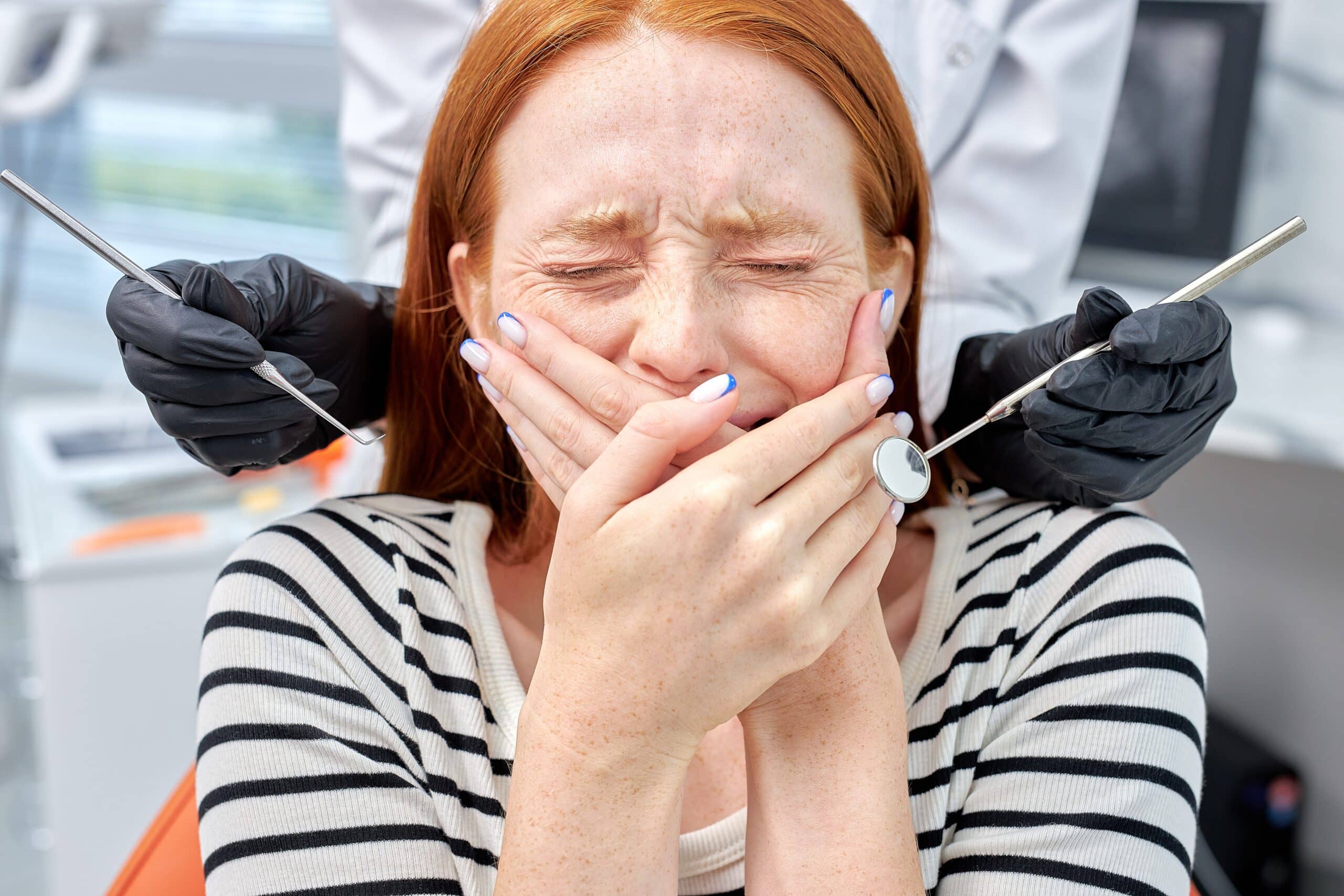Let’s face it, dentists can be downright scary for some folks. The thought of sitting in that chair while someone pokes and prods at your teeth is enough to make anyone feel a bit queasy. And yes, sometimes the fear or discomfort might even lead to tears. But here’s the thing: it’s perfectly okay to cry at the dentist.
Now, you might be wondering why I’m saying this. Isn’t crying usually seen as a sign of weakness? Well sure, society often labels tears as such but let me tell you something important – when it comes down to our emotions and feelings of distress or pain, there should never be any shame involved.
So if you’ve ever found yourself shedding a tear (or two) during your dental appointment and wondered if that was normal or acceptable – rest assured it is! Remember we’re all human with different reactions to situations like these so next time you find yourself feeling overwhelmed in that dental chair don’t hold back those tears; let them flow freely without judgment.
Understanding Dental Anxiety

We’ve all been there. The fear of that looming dental appointment can sometimes be overwhelming. It’s not uncommon to feel a bit anxious about sitting in the dentist’s chair. This feeling is often referred to as dental anxiety, and it affects countless people around the world.
Dental anxiety isn’t just your typical nervousness; it’s a real issue that can hinder your oral health. People with severe dental anxiety may even avoid their regular check-ups, leading to more serious problems down the line like gum disease or tooth decay.
So why does this happen? There are many factors at play here:
- Past Experiences: If you’ve had an unpleasant experience at the dentist before, you’re likely to develop some level of apprehension towards future visits.
- Pain Fear: The thought of experiencing pain during a procedure can instill fear in many individuals.
- Feeling Helpless: Lying back in a chair while someone pokes around inside your mouth could leave anyone feeling somewhat vulnerable and out of control.
It’s essential for everyone – dentists included – to understand that these feelings are entirely normal and nothing to be ashamed about. After all, we’re only human! More importantly though, being aware of this anxiety allows us both as patients and healthcare providers alike to find ways in managing these fears effectively so they don’t prevent us from getting necessary treatment.
In fact, crying at the dentist due solely from stress or fear is okay! Tears serve as our body’s natural response mechanism when dealing with heightened emotions – including those stemming from dental procedures.
Remember: acknowledging one’s fears is always step one toward overcoming them!
Common Causes of Fear in Dentistry
Let’s dive into the heart of dental fears. It might surprise you to learn that a whopping 36% of the population suffers from what’s known as dental anxiety, while another 12% experience extreme dental fear. That’s quite a lot! So, why does visiting the dentist stir up such strong emotions?
One common cause is past traumatic experiences at the dentist office. These can range from painful procedures to insensitive comments made by dentists or hygienists. Patients often remember these unpleasant encounters and develop a deep-seated fear over time.
Another significant contributor is societal influence – those horror stories we hear about root canals gone wrong or extraction pain that lasted for weeks sure don’t help calm our nerves! In fact, according to one study:
| Percentage (%) | Fear Source |
|---|---|
| 68 | Hearing others’ bad experiences |
| 16 | Media portrayal |
It appears most people have their fears stoked by hearing others’ negative tales!
A third factor fueling this fear could be related to control and trust issues with medical professionals in general. If I feel like I’m not in control or if I don’t trust my dentist completely, it heightens my anxiety level significantly.
Lastly, some folks just naturally have higher levels of anxiety than others due to various factors such as genetics or upbringing – they’re simply more susceptible to feeling anxious during visits.
So there you have it: past traumas, societal influences, control issues and inherent nervousness are all culprits behind our collective dread towards dentistry.
Is It Okay to Cry at the Dentist?

Let’s dive straight into it. When fear and anxiety start creeping in, your dental appointment can quickly turn from routine check-up to a teary ordeal. But here’s the thing – it’s completely okay to cry at the dentist! You’re not alone, as I’ve found out through my research.
Data from Harvard Medical School reveals that 13% to 24% of people around the world experience dental anxiety or phobia. That means millions are getting nervous, anxious, and yes – sometimes even crying during their visits!
| | Percentage |
|---|------------|
| People experiencing dental anxiety worldwide | 13%-24% |
So why do we cry? Often our tears are an emotional response triggered by feelings of vulnerability or lack of control. And let’s face it – sitting in a dentist chair while someone pokes around your mouth can certainly stir up those feelings!
Now onto some good news: dentists understand this reality better than anyone else! Many have strategies for helping patients cope with these emotions:
- Providing clear explanations about procedures
- Offering breaks during treatment
- Using calming techniques such as guided imagery
For children especially (who make up a significant portion of tearful patients), many dentists use techniques like “tell-show-do” where they first explain what they’re going to do, show them on a model or their finger before proceeding with actual treatment.
Another comforting fact is that medical professionals consider empathy part of their job description. They’re trained not just in treating teeth but also dealing with scared or upset patients – so if you need reassurance or simply need time for a good cry before continuing on with your procedure…well then go ahead!
In essence, shedding tears at the dentist isn’t something you should be embarrassed about nor suppress because everyone has unique reactions when dealing with stressful situations like visiting a healthcare provider. Remember, your dentist is there to help you – so let them know how you’re feeling and they’ll do their best to make the experience as comfortable for you as possible!
Coping Strategies for Dental Appointments
Let’s face it, dental appointments can be nerve-wracking. The thought of sitting in the dentist’s chair while they poke and prod around your mouth isn’t exactly a walk in the park. And yes, it’s okay to cry at the dentist! It shows that you’re human and have feelings too. But there are ways to make these visits less daunting.
Deep breathing exercises can work wonders when you’re feeling anxious about an upcoming dental visit. By taking slow, deep breaths through your nose and exhaling out of your mouth, you’ll help calm your nerves before stepping into the dentist’s office.
Distraction is another effective strategy I’ve found helpful during my own dental appointments. Try listening to some calming music or a podcast on headphones during treatment – anything that will take your mind off what’s happening inside your mouth!
It might seem simple but knowing what to expect can really alleviate anxiety associated with dental visits. Ask questions ahead of time so there are no surprises once you’re seated in that chair.
I also find value in scheduling my appointments first thing in the morning – this way, I’m not spending all day dreading it! Plus, most dentists recommend morning cleanings since our mouths tend to be cleaner after night-long fasting periods.
Lastly, remember: dentists aren’t villains; they’re here for our oral health! They understand people get nervous and have seen everything – including tears! So don’t worry about crying; instead focus on how much healthier and happier you’ll feel post-appointment.
How Professionals Handle Emotional Patients

I’ve seen it firsthand, how dental professionals handle emotional patients. It’s a delicate balancing act of empathy and professionalism. Many dentists and their staff are trained in handling situations where a patient might be feeling particularly vulnerable or upset.
One method that’s commonly used is the “tell-show-do” technique. The dentist will first TELL the patient about what they’re going to do, then SHOW them on a model or with their instruments, before finally DOING the procedure. This helps to ease any fears by demystifying what’s happening.
Dentists also work hard to create an environment that feels safe and welcoming for patients who may be anxious or fearful. They do this by:
- Ensuring there are comfortable seating areas
- Offering distractions such as televisions or music
- Providing clear explanations about procedures
- Encouraging questions from patients
Another strategy employed is called distraction techniques – think headphones playing soothing music, stress balls for squeezing, even sedation dentistry options if needed.
Of course every person is unique so different approaches work for different people but these methods have shown great effectiveness overall.
Lastly let me mention that many dental practices also offer professional counseling services should you find your emotions running high during your visit.
Remember – it’s okay to express your feelings at the dentist’s office! They’re there not only to care for our teeth but also our well-being during our visits!
The Role of Communication in Overcoming Fears
Ever find yourself wondering why it’s so common for people to shed a tear or two at the dentist? I’ll tell you, it’s not just about the physical discomfort. Often, our fears are fueled by uncertainty and lack of understanding.
Now let’s consider this: what if your dentist took a few extra minutes to explain what they’re going to do before they start poking around in your mouth? In my experience, when dentists make an effort to communicate with their patients clearly and compassionately, it can significantly reduce anxiety. It’s all about replacing fear with knowledge. After all, we humans tend to fear what we don’t understand.
So how does this communication work? Let me break it down:
- Explanation: Before starting any procedure, a good dentist will take time explaining exactly what they’re going to do.
- Permission: Dentists should always seek consent before proceeding with treatment. This gives patients control over their own experiences.
- Reassurance: A comforting word here and there during treatment can go a long way in calming nerves.
That said though; remember that everyone is different. What works wonders for one patient may not be as effective for another one because each person has unique needs and responses.
In fact – research supports this idea! According to data from The Journal of Dental Research, effective communication between dentists and patients resulted in less dental anxiety overall (see table below).
| Study | Reduction Rate |
|---|---|
| JDR | 20% |
Another study published by Community Dentistry And Oral Epidemiology found similar results – open dialogue helped reduce patient stress levels considerably!
It seems clear then: communicating effectively helps us overcome fears at the dentist’s office – making those tears far less likely! So next time you find yourself feeling anxious about sitting on that dental chair – speak up! Ask questions, seek explanations. You might just find that knowledge is indeed the best antidote to fear.
Benefits of Confronting and Overcoming Your Fear

Let’s talk about fear, specifically dental fear. It’s not uncommon to feel a twinge of anxiety when you think about sitting in that chair, mouth wide open while the dentist pokes around with sharp instruments. But here’s the thing: overcoming this fear has benefits that go beyond just getting your teeth cleaned.
When you confront your dental anxieties head-on, you’re taking steps towards better oral health. Avoiding regular check-ups because they scare you can lead to serious problems down the line like gum disease or tooth decay – issues which could have been prevented with regular care.
| Potential Dental Problems | Cause |
|---|---|
| Gum Disease | Neglected Oral Hygiene due to Dental Fear |
| Tooth Decay | Avoidance of Regular Checkups due to Anxiety |
Then there’s self-confidence. A healthy smile can do wonders for how we feel about ourselves! So by facing your fears and keeping up with those dentist appointments, you’re investing in more than just physical health – it’s also a boost for mental well-being.
But perhaps one of the most profound benefits is personal growth. Each time we face our fears (dental or otherwise), it makes us stronger individuals overall:
- We learn resilience.
- We build confidence.
- We prove to ourselves that we can overcome challenges.
Remember though; overcoming doesn’t always mean eradicating completely – sometimes it simply means managing effectively so as not be held back by our fears anymore!
So yes, if shedding a few tears at the dentist helps get through an appointment and keeps those pearly whites healthy… then I’d say it’s okay indeed! In fact, confronting such feelings might even help lessen their grip over time; after all exposure therapy is one recognized way psychologists use treat phobias and anxieties.
In short: don’t let dental anxiety keep from maintaining good oral health. Cry if you need to, but don’t skip out on those appointments. You’ll be doing yourself a big favor in more ways than one!
Conclusion: Embracing Vulnerability at the Dentist’s Office
I’ve spent a good amount of time discussing whether it’s okay to cry at the dentist. After much thought and research, I believe we’ve reached an understanding.
Crying is a natural human response to stress, discomfort, or fear. It doesn’t make you weak or childish – it simply means you’re experiencing strong emotions. So if you find yourself tearing up in the dental chair, remember this: It’s perfectly okay.
Let me emphasize that dentists are professionals trained not only in oral health but also patient care. They understand that dental procedures can be nerve-wracking for some people and they’re equipped to handle your emotional reactions with compassion and empathy.
- Don’t feel embarrassed about crying.
- Communicate your fears with your dentist.
- Remember dentists are there to help not hurt.
Taking these steps might just transform those tears into relief and trust towards your dentist over time.
In conclusion (remember no comma), embracing vulnerability at the dentist’s office is not only acceptable but can also enhance our overall experience by fostering open communication between us patients and our healthcare providers. There’s nothing wrong with shedding a tear or two during appointments—it makes us human after all! And who knows? With each visit, we may find ourselves growing stronger emotionally as well as physically when it comes to facing our dental health challenges head-on!


